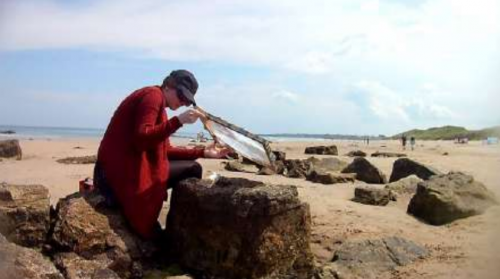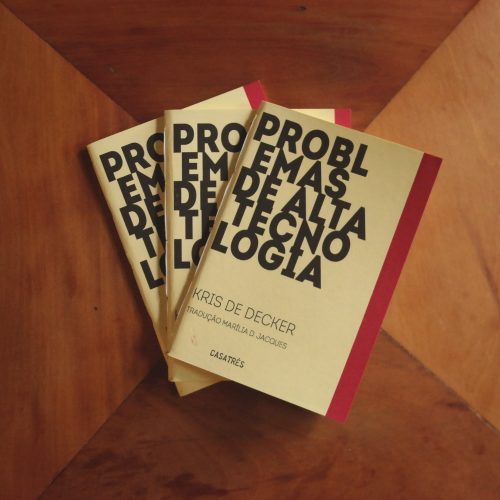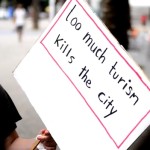- Low-tech at the University. [Kairos] The challenge of low-tech is not to juxtapose harmless « soft » alternatives to industrial technologies, as this would only create a new niche market for « responsible consumers ». It is a question of replacing, as much as possible, the industrial productions by artisanal productions, adapted to the direct environment of their user, selected, understandable, repairable, adaptable and durable.
- Why the past 10 years of American life have been uniquely stupid. [The Atlantic] “The main problem with social media is not that some people post fake or toxic stuff; it’s that fake and outrage-inducing content can now attain a level of reach and influence that was not possible before 2009.”
- Stuck Between Climate Doom and Denial. [The New Atlantis] The incredibly fascinating, important, and nuanced issue of climate change has become an online team sport between the good guys (your side) and the bad guys (the other side).
- The Unabomber and the origins of anti-tech radicalism. [Journal of Political Ideologies]. “As today’s most infamous anti-tech radical, and as the one with the most detailed blueprint for a revolution, Kaczynski may well become the ‘Marx’ of anti-tech.”
- The Degrowth conundrum. [Resilience] “Only when the right ideas and values become predominant can structural change towards simpler lifestyles and systems take place. These conditions show the fundamental mistake built into the standard socialist assumption that the good society must have highly centralised state control. And it shows that the standard socialist strategy of taking control of the state is also fundamentally mistaken.”
- Ecological Civilisation: Beyond Consumerism and the Growth Economy – Free Course. “This video series will be grappling with the problems of consumerism and the growth economy; envisioning alternative, post-carbon ways of life; and considering what action can be taken, both personally and politically, to help build an ecological civilisation.”
- Why we need the apocalypse. [Unherd] In modern terms, “apocalypse” has come to mean “the cataclysmic end of everything”. But this is a long way from the ancient Greek understanding: to uncover, to disclose or lay bare. From this perspective, apocalypse isn’t the end of the world. Or at least, not just the end of the world. Rather, it’s the end of a worldview: discoveries that mean a previous way of looking at things is no longer tenable.
- Monbiotic Man. [The Land] “Simon Fairlie assesses the farm-free future for humanity spelled out in George Monbiot’s latest book ‘Regenesis’.”
- Beyond rescue ecomodernism: the case for agrarian localism restated. [Small farm future] “Given the present world historical moment of profound crisis that the modernist myth of progress has generated and cannot tackle, it surprises me how powerfully it still animates almost all mainstream responses to the crisis.”
- Should we be trying to create a circular urine economy? [Ars technica] “Urine diversion could solve a lot of the environmental problems that plague overwhelmed wastewater treatment systems, but it’s a whole different way of thinking.”
- How To Deflate An SUV Tyre. [Tyre Extinguishers]. “Because governments and politicians have failed to protect us from this danger, we must protect ourselves.”
- Useless Car.
- Silicon Valley’s Push Into Transportation Has Been a Miserable Failure. [Gizmodo] The titans of tech brought plenty of disruption to our broken transportation system but delivered little in the way of innovation.
- The global warming reduction potential of night trains. [Back on Track] “Back-on-Track, a European network of night train initiatives, has examined air passenger numbers in the EU in 2019 to see which air connections could be replaced by night train connections.”
- The attack on rail. [Compact Magazine]. “Disorder, war, and general chaos have conspired to prevent what ought to have been the global triumph of the railway.”
- Chronotrains. This map shows you how far you can travel from each station in Europe in less than 5 hours.
- Orbis. ORBIS allows us to express Roman communication costs in terms of both time and expense. By simulating movement along the principal routes of the Roman road network, the main navigable rivers, and hundreds of sea routes in the Mediterranean, Black Sea and coastal Atlantic, this interactive model reconstructs the duration and financial cost of travel in antiquity.
- Fuck Off Google.
- After self-hosting my email for twenty-three years I have thrown in the towel. The oligopoly has won. [Carlos Fenollosa]
- FreedomBox. FreedomBox is a private server for non-experts: it lets you install and configure server applications with only a few clicks. It runs on cheap hardware of your choice, uses your internet connection and power, and is under your control.
- Old age isn’t a modern phenomenon – many people lived long enough to grow old in the olden days, too. [The Conversation] It’s incorrect to view long lives as a remarkable and unique characteristic of the “modern” era.
- The Healing Power of “Bello”. [Craftsmanship Quarterly] How an intentional community in Italy uses craftsmanship—and a sense of family—to holistically rehabilitate people who are suffering from drug addiction.
- The making and knowing project. “The Making and Knowing Project is a research and pedagogical initiative in the Center for Science and Society at Columbia University that explores the intersections between artistic making and scientific knowing. Today these realms are regarded as separate, yet in the earliest phases of the Scientific Revolution, nature was investigated primarily by skilled artisans by means of continuous and methodical experimentation in the making of objects – the time when “making” was “knowing.””
DIY Wooden Bike Trolley
Marie Verdeil made a tutorial for a simple wooden bike trolley. It is available in English and French on the Low Tech Lab wiki.
Method to create a simple bike trolley, using up-cycled materials. Easily fixated to every bike (adult size). Holes on the board help attach any kind of cargo. It’s made out of wood and simple hand tools, no welding required. Dimensions are detailed and can easily be adapted to the material available.
I tried to create a trolley, which can replace the car to go to the market / grocery shopping. No need to transport heavy cargo, but big objects (cardboard boxes, crates, wood, etc.) – Therefore it needs to be easily adaptable, with the option to fix a crate on the board. + Priority goes to second-hand materials!
Solar Concentration for Craft Practice
“This research indicates the technical capabilities of using a 40 cm2 Fresnel lens to heat, melt and vitrify a variety of materials and suggests future applications of this technology including the ability to digitise the process. This material processing technique offers an alternative to heat matter and is significant in geographical locations with ample sunlight, offering a cost-effective option to traditional heating methods and allows directional heating, which local craftspeople can exploit to their creative advantage.” [Read more…]
The Contradictory Bind
Quoted from: Cloudmoney: Cash, Cards, Crypto and the War for our Wallets, Brett Scott, Vintage Publishing, 2022, ISBN: 9781847925879.
When describing the rise of automated surveillance capitalism, it is easy to point out its various dangers, but something more subtle drives my own discomfort. It is the pervasive feeling of inauthenticity that accompanies it. It is that tremor of emotional conflict a person feels when — in full knowledge of how Amazon is taking over the world — they nevertheless sense the futility of resistance, and find themselves with their finger on the ‘Buy’ button…
We have blindly stumbled into systems that exploit our short-term desires to the detriment of our longer ones, and they break and disrupt our lives if we attempt to pull back from them. Rather than crawling to Utopia, then, large-scale markets crawl towards concentrating production and consumption into pure conglomerations of profit-seeking, represented most acutely by transnational corporations. While the individuals who work within this conglomeration can feel many things, the financial and corporate sector as an institutional complex is unable to ‘feel’ anything except profit, so our systems are running away with us, like a centrifuge spinning ever faster. [Read more…]
Low-tech Zine
Brazilian “mini-publisher” Casatrês made a beautiful zine which includes three articles from Low-tech Magazine, translated into Portuguese. It is for sale on their website.
Damaged Earth Catalog
“We are humans and might as well get used to it. So far, remotely done power and glory—as via government, big business, formal education, church—has succeeded to the point where gross profits obscure actual loss. In response to this dilemma and to these losses a realm of intimate, community power is developing—power of communities to conduct their own education, find their own inspiration, shape their own environment, and share their knowledge with others. Practices that aid this process are sought and promoted by the DAMAGED EARTH CATALOG.”









